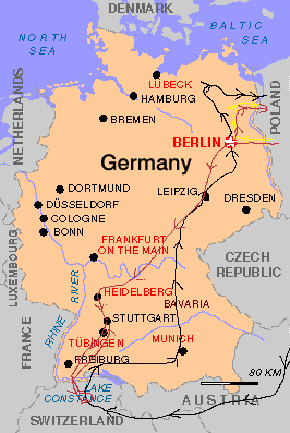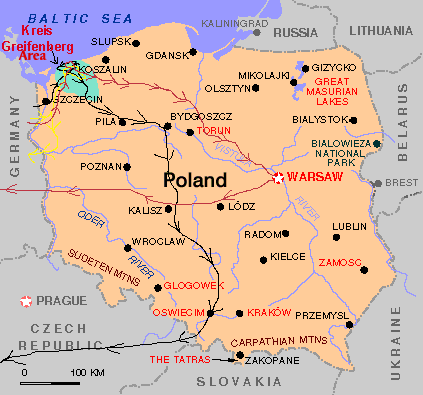Home
Maps
Research Trips
Heuer Book
Heuer Direct Line
Found
Relative
Heuer
Timelines
Greifenberg
Villages
Kirchenspiele
Links
Guest Book
Search
About Us
Contact Us |
|
Research and Research Trips |
| Research - The hours of research dedicated
to ensuring the accuracy of information in the Heuer Family Book was
a monumental task. The greatest amount of time dedicated to
research were the countless hours of searching through literally
thousands of films obtained from the
Church of Jesus Christ of Latter Day Saints for pertinent
information on the Heuers we were tracking. A lot was learned
during this process and we felt it would be helpful if passed some
of this information on to other researchers. Follow this link
for
research basic guidelines. |
|
Research Trips to Poland
 |
 |
Our family made three separate trips to Poland to get a sense, a feel,for
the area our ancestors came from. We always wondered, why or what made
them come to Wisconsin, namely to the shores of Lake Michigan. Once we drove
through the countryside north and slightly east from Stettin (Szczecin),
Poland and set foot on the shores of the Baltic near Hoff, we
had our answer. We felt as though we were home on the farm in
Wisconsin, on the shores of Lake Michigan. There was very little
difference!
On the Poland Map
above, right, in the upper left hand corner is the general location of our
focus, as this is the area of Pommern where our ancestors originated.
On the maps above, our driving trail is denoted by the black, yellow or red
lines with arrows. The black line
represents the first trip taken September of 1996, yellow line,
March of 1997 and red line for May of 1998.
|
|
An Observation Worth Noting
|
|
Each of our trips began in Berlin and
ended in Berlin. It became very apparent quickly what a negative
impact the communist governing system imposed upon the people who were
subjected to that type of government. On one trip, we flew from Warsaw to
Saint Petersburg Russia, so we were able to compare all three environments,
those of Russia, what was "East Germany and Germany.
As one would progress East from
Germany into the newly annexed area that was "East Germany", one could see a
world of difference in the maintenance of the buildings and the general
infrastructure. The further East one proceeded the worse the infrastructure
was. It was very enlightening.
In what was "East Germany" we found
cemeteries surrounding the churches, however once we crossed the border into
Poland, there were no traces of any of the cemeteries as at the end of WWII,
once the Germans were forced out of the area, the Polish people destroyed
the cemeteries. They wanted no traces of the Germans whom had occupied
these lands for several hundred years. The destruction was complete,
headstones were ground up and used for road paving or they were used to
build fences. At one church we found many headstones embedded into a
wall that had been constructed around the church. Typically, the new
cemeteries used by the Polish were several blocks from the church. I
do not know the reason for this, I can only assume they did not want to go
to the extreme of exhuming the bodies that surrounded the churches in now
"the unmarked graves".
There was one exception where, in a
Polish Church cemetery, which was on the church grounds, we found a Polish
cemetery. What was unique in this cemetery is that although there were
no recognizable grave markers that carried German names there were field
stones placed alongside of trees that had the names of German deceased along
with their birth and death dates. It seemed as though this congregation of
Polish people somehow was able to reconcile in their minds that it was
alright to co-exist in the same cemetery with the Germans and recognized
this with the representative stones.
|
|
Click on any of these
cities / villages to display pictures and descriptions!
|
|
|

